I. 2. WHITE RELIGIOUS SONGS & I. 3. THE HOLINESS PEOPLE
CONTENTS
I. 2. White Religious Songs
Over Jordan (Wayfaring Stranger)
Oh, Lovely Appearance of Death
The Romish Lady
I. 3. The Holiness People
Keep Your Hands on That Plow
The Little Black Train
Holy Ghost
------------------------------------------------
[This is Hobert Smith family singing wiht Hobert playing guitar; collected by Alan Lomax; Listen: Wayfaring Stanger]
OVER JORDAN (Wayfaring Stranger)
L. L. McDowell, Smithville, Tenn. By courtesy of Sidney Robertson and Charles Seeger. See Ja.2, p. 715 De, 1695 Ja.i, pp. 250 ff. See No. 3223. L. L. McDowell, Smithville, Tennessee, says that this is the tune sung by the old settlers of De Kalb County. Additional stanzas are made by changing the word "father" to "mother," "brother," "sister," etc.
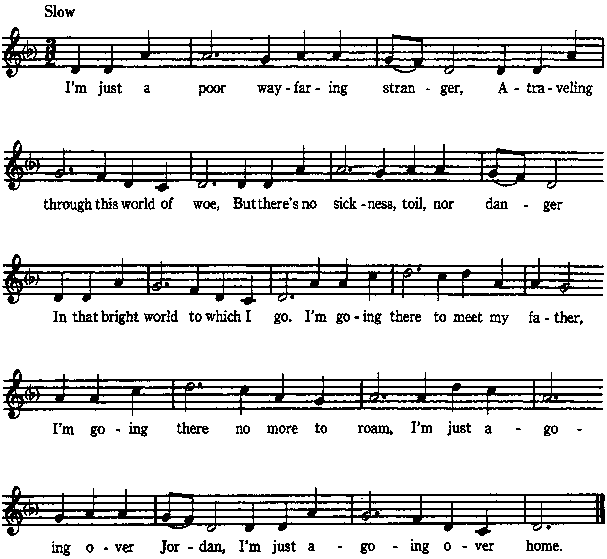
I'm just a poor wayfaring stranger
A-trav'ling through this land of woe.
But there's no sickness, toil nor danger
In that bright world to which I go.
I'm going home to see my father (mother, sister, brother etc.)
I'm going there no more to roam;
I'm just a-going over Jordan
I'm just a-going over home.
---------------------------------------------------
OH, LOVELY APPEARANCE OF DEATH
g'. No. 1491. Mr. and Mrs. Boyd Hoskins, Clay County, Ky., 1937, and note from Ola E. Winslow, American Broadside Verse (Yale Univ. Press).
Reverend George Whitefield, a distinguished follower of John Wesley, the founder of Methodism, ten years before his death wrote this song to be sung at his own funeral. Although he had been a minister of the Church of England and a graduate of Oxford, Whitefield became the first circuit rider in the American Colonies. His parish extended to the most remote settlement, and his preaching and influence established Methodism firmly. Benjamin Franklin estimated that Whitefield's magnetic and powerful voice could reach an audience of twenty thousand. He made seven trips from England to America, staying sometimes several years.
When Whitefield died in 1770, Phillis, a seventeen-year-old Negro girl only nine years out of Africa, who belonged to J. Wheatley of Boston, wrote a sixty-two-line "elegiac poem on the death of the celebrated Divine and eminent servant of Jesus Christ, the late Reverend and pious George Whitefield, Chaplain to the Right Honourable the Countess of Huntingdon, who made his exit from this transitory state to dwell in the celestial realms of bliss on Lord's Day, when he was seized with a fit of asthma at Newbury-port near Boston, in New England.
"He leaves this world for Heaven's unmeasured Height, And worlds unknown receive him from our sight."
The following version of George Whitefield's funeral hymn was sung for us by a deacon and a deaconess of the Hard-Shell Baptists in Clay County, Ky., in 1937.

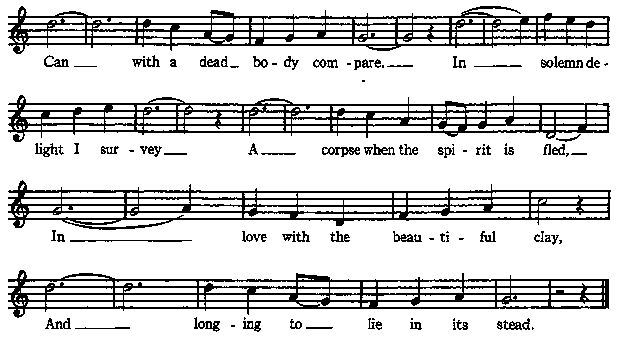
1 Oh, lovely appearance of death,
What sight upon earth is so fair?
Not all the gay pageants that breathe
Can with a dead body compare.
In solemn delight I survey
A corpse when the spirit is fled,
In love with the beautiful clay,
And longing to lie in its stead.
2 Its languishing pain is at rest,
Its aching and aching are o'er,
The quiet immovable breast
Is pained by affliction no more.
The heart it no longer receives
Of trouble and torturing pain,
It ceases to flutter and beat,
It never shall flutter again.
------------------------------------------------------
[Listen: Almeda Riddle: http://web.lyon.edu/wolfcollection/songs/riddleromish1246.mp3]
THE ROMISH LADY
Music and text from Walker, William, The Southern Harmony, E. W. Miller, Philadelphia, 1854, facsimile reprint from Hastings House, New York, 1939. No. 1040. Mrs. Minnie Floyd, Murrells Inlet, S.C., 1937. See Ja.2, p. 27; Ed, p. 2215 Sc.2, p. 1765 Be, p. 450.
"My mother taught me the tune to 'The Romish Lady' long before I knew all the words. I caught up the tunes easy when I was a little thing. But I couldn't find anybody could tell me all the words straight through until I was a big girl, about grown.
"Way years ago, a lady got bad burnt. She lived in the woods way uf the road from us. She was burnt awful bady the worst I ever saw. A nd her husbandy he was so old and so bad crippled that he wasn't any good to help her; in facty he was laid up in bed most of the time himself. Mother said one day we ought to go up therey and Pappy said we ought to go up there} too. We didn't have no moneyy nor nothing much to eat} except just enough to keep skin and bones together for all of us children. Welly Mother looked aroundy and she said she guessed anybody that was bad burnt could use some clean rags. So she got a big bundle of clean rags togethery and I took 'em up there.
"Welly when I got therey it was the awfullest pitiful sight I ever saw. I was ashamed I didn't have no money nor even anything to eat with me. But as soon as ever the lady saw mey she saidy 'The Lord sent you.'
" 'No' says I. 'Just my mother and daddy sent you some old clean rags'
" 'If they'd sent a ten-dollar billy it couldn't be better' she said like she meant it.
"Welly I stayed on that day to sorter clean up and cook 'em a little something to eat. Then they seemed to need somebody to nurse 'em so bad that I just stayed on for a spell. I was going to be married the next weeky but I just put that off; and I stayed on there twelve weeks, all time putting off the wedding that much longer. And 1 guess it'd 'a' been just as well if I had put it of for always.
"The lady had a lot of booksy most of 'em religious books and hymn-books. One of 'em was called 'Christian Harmony Note Booky as I recollect the name. It had 'The Romish Lady' in it. And that's where I learned the rest of the words. I had plenty of time to learn 'em and sing in the evenings. I don't know what I would have done without my tune singingy and the burnt lady said she didn't know what they would have done neither without me a-singing. I sure was glad to learn the rest of 'The Romish Lady' " —Mrs. Minnie Floyd, Murrells Inlet, South Carolina.
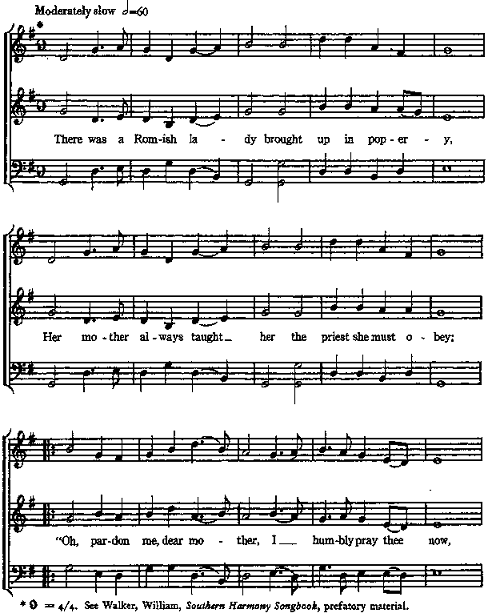
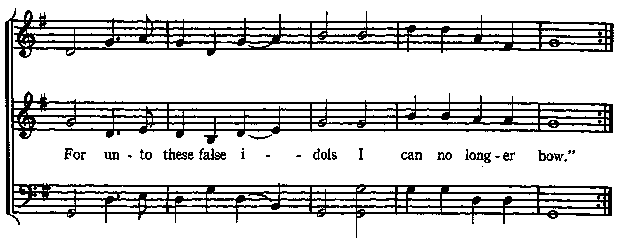
1. There was a Romish lady brought up in popery,
Her mother always taught her the priest she must obey;
"Oh, pardon me, dear mother, I humbly pray thee now,
For unto these false idols I can no longer bow."
2 Assisted by her handmaid, a Bible she conceal'd,
And there she gain'd instruction, till God his love reveal'd.
No more she prostrates herself to pictures deck'd with gold,
But soon she was betray'd, and her Bible from her stole.
3 "Pll bow to my dear Jesus, I'll worship God unseen,
I live by faith forever, the works of men are vain;
I cannot worship angels, nor pictures made by men,
Dear mother, use your pleasure, but pardon if you can."
4 With grief and great vexation, her mother straight did go,
To inform the Roman clergy the cause of all her woe;
The priests were soon assembled, and for the maid did call,
And forc'd her in the dungeon, to fight her soul withal.
5 The more they strove to fright her, the more she did endure,
Although her age was tender, her faith was strong and sure;
The chains of gold so costly they from this lady took,
And she with all her spirits the pride of life forsook.
6 Before the Pope they brought her, in hopes of her return.
And there she was condemned in horrid flames to burn.
Before the place of torment they brought her speedily,
With lifted hands to heaven she then agreed to die.
7 There being many ladies assembled at the place,
She raised her eyes to heaven and begg'd supplying grace.
"Weep not, ye tender ladies, shed not a tear for me—
While my poor body's burning, my soul the Lord shall see.
8 "Yourselves you need to pity, and Zion's deep decay;
Dear ladies, turn to Jesus, no longer make delay."
In comes her raving mother, her daughter to behold,
And in her hand she brought her pictures deck'd with gold.
9 "Oh, take from me these idols, remove them from my sight;
Restore to me my Bible, wherein I take delight.
Alas, my aged mother, why on my ruin bent?
'Twas you that did betray me, but I am innocent.
10 "Tormentors, use your pleasure, and do as you think best—
I hope my blessed Jesus will take my soul to rest."
Soon as these words were spoken, up steps the man of death,
And kindled up the fire to stop her mortal breath.
11 Instead of golden bracelets, with chains they bound her fast;
She cried, "My God give power, now must I die at last?
With Jesus and his angels forever I shall dwell.
God pardon priest and people, and so I bid farewell."
I. 3. THE HOLINESS PEOPLE
The "Holiness" preachers frankly tell their congregations that they want them to have a good time in church. As one said, "I believe God would like to look down and see his little children dancing before his altar like we are." It is in character for his wife to play a guitar or a piano and to lead and compose inspirational songs. Musical instruments—from fiddles to saxophones—are played in church and the hymns sung are the liveliest of revival tunes, Negro and white. Speaking in tongues, holy dancing, public confession of sin, handling of rattlesnakes and of fire, all these offer amusement and an opportunity for individual expression to the bitterly poor of America. Like the rural Negro church services, the Holiness meetings are a sort of American folk theater, and their recent mushroom growth in every part of the United States, across barriers of race and language, proclaims their firm basis in the folkways of America.
KEEP YOUR HANDS ON THAT PLOW
A No. 1397. Elihu Trusty, Paintsville, Ky., 1937. See Sh, 2: 292; Whi, p. 115. A hymn of the Holiness Church sung by the sect that believes in foot washing. Also sung: as a Negro spiritual.
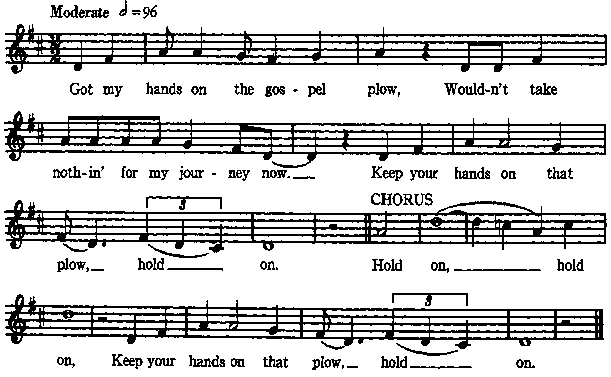
1. Got my hands on the gospel plow,
Wouldn't take nothin' for my journey now.
Keep your hands on that plow, hold on.
Chorus: Hold on, hold on,
Keep your hands on that plow, hold on.
2 Took Paul and Silas, put 'em in the jail,
Had no one to go their bail.
Keep your hands on the plow, hold on.
3 Paul and Silas, they begin to shout,
Jail doors opened and they walked out.
Keep your hands on the plow, hold on.
4 Peter was so nice and neat,
Wouldn't let Jesus wash his feet.
Keep your hands on the plow, hold on.
5 Jesus said, "If I wash them not,
You'll have no father in this lot."
Keep your hands on the plow, hold on.
6 Peter got anxious and he said,
"Wash my feet, my hands and head."
Keep your hands on the plow, hold on.
-------------------------------------------------------------
[Listen: Little Black Train by Carter Family]
THE LITTLE BLACK TRAIN
No. 1394. Brother Elihu Trusty, Paintsville, Ky., 1937. See Whi, p. 655 Sc.2, p. 260.
Chorus (intermittent through the song):
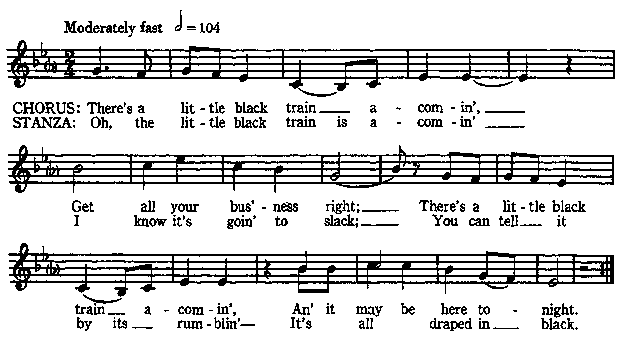
There's a little black train a-comin'—
Get all your business right;
There's a little black train a-comin',
An' it may be here tonight.
1 Oh, the little black train is a-comin',
I know it's goin' to slack,
You can tell it by its rumblin'—
It's all draped in black.
2 The train we are singin' about,
It has no whistle or bell,
And when you find your station
You are in heaven or hell.
3 There's a little black train and an engine.
And one small baggage car;
You won't need to have much baggage
To come to the judgment bar.
4 O Death, why don't you spare me?
I see my wicked plight.
Have mercy, Lord, to hear me,
Come and set me right.
5 Oh, Death had fixed the shackles
Around his throat so tight,
Before he got his business fixed,
The train rolled in that night.
6 They are men and women
What love their sport and game,
Yet Death is ridin' with them
Will take them just the same.
7 Go tell that barroom lady,
All filled with worldly pride,
That Death's black train's a-coming—
Prepare to take a ride.
8 There's a rich old man in his darkness
Says: "I have no such fears—
I'll build my barns a little larger,
For I'll live a million years."
9 So while he sat there plannin',
The God of power and might
Took the old fool to the judgment bar,
So his soul's in the fire tonight.
HOLY GHOST
B, b. No. 1346. Mr. and Mrs. Crockett Ward and Mrs. Thomas Rutherford, Galax, Va., 1937. See Whi, p. 97.
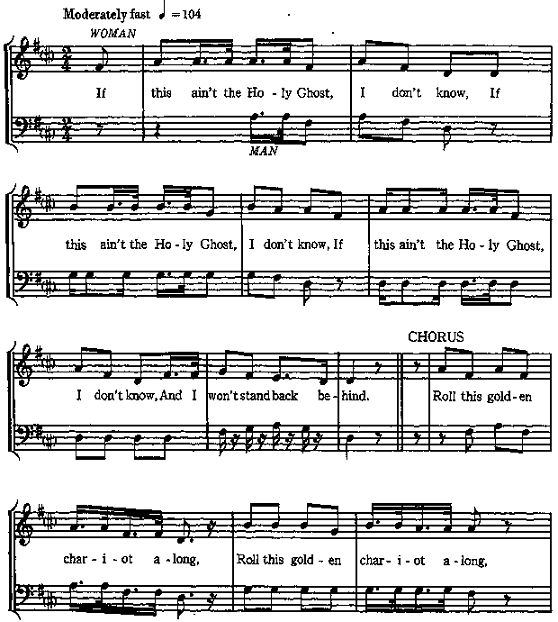

1. If this ain't the Holy Ghost, I don't know,
If this ain't the Holy Ghost, I don't know,
If this ain't the Holy Ghost, I don't know,
And I won't stand back behind.
Chorus: Roll this golden chariot along,
Roll this golden chariot along,
Roll this golden chariot along,
And I won't stand back behind.
2 Effie'll beat the tambourine and I'll beat the drum,
Effie'll beat the tambourine and I'll beat the drum,
Effie'll beat the tambourine and I'll beat the drum,
And I won't stand back behind.